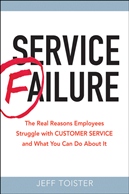Why customer service isn't always obvious
 Jeff Toister
Jeff Toister  Tuesday, April 12, 2011 at 12:40PM |
Tuesday, April 12, 2011 at 12:40PM | The video below contains a simple observation exercise. I encourage you to watch the short video before reading the rest of this post (it's less than 90 seconds long). (For my email readers, here's a link.)
Researchers Christopher Chabris and Daniel Simons found that only 50% of people notice the gorilla in the video the first time they watch it. Why? A strange phenomenon called inattentional blindness where our focus on one thing causes us to miss something that would otherwise be obvious.
I recently saw an example of this first hand when dining at one of my favorite local restaurants with my wife and her parents. The restaurant was very crowded so the only open table was tucked into a corner in the back of the restaurant. Unfortunately, we hardly saw our server after she took our orders. Our water glasses sat empty, we finished our meals before we had a chance to order a few cocktails, and she took a long time to bring our check. From our perspective, it was obvious that she should have paid more attention to us.
So, what could have gotten in the way? I observed a few things that may have caused her to unintentionally neglect our table.
-
Our table was tucked away behind a wall and out of sight from the rest of her section.
-
A large group was seated in her section just after we arrived and it was quite a production to take their orders, bring them drinks, etc.
-
Our server carried only one plate at a time in each hand, even when picking up dirty dishes, hinting at a lack of experience in restaurant service.
If you imagine we were out of sight on a busy evening with an inexperienced server who was trying to keep all her tables straight, you can understand why we might have been forgotten in the frenzy.
A great question to ask about your own employees is what might be distracting them from seeing obvious customer service opportunities?




Reader Comments (3)
That is such a great question.
Whether it's poor service in a restaurant or in a corporate customer service setting - or even poor performance in a non-customer-service job - managers and supervisors often forget to ask questions like this. Instead, they chastise the employee and/or even fire him or her.
When instead simply asking, "What's keeping you from doing a better job? What's distracting you from seeing what you need to see in order to perform better?" could help not just one employee get better, but potentially the whole department or team!
Thanks for the comment, Grace. I think you observation that managers forget to ask some simple questions is spot on. Just for fun, check out this blog post about the WORST way a manager could react to poor customer service. (Sadly, I used to enjoy going to this restaurant when I lived in Boston.)
Server not Servant blog post
What I found truly fascinating about the link you post is the wide range of comments it got!
I know this is going rather far astray from your original post topic here (sorry!), but when a business is publicly reviewed on a site such as Yelp, the way they respond can be incredibly telling.
Some business owners take it very personally and get incredibly snarly in response. I've seen that happen at otherwise very good establishments. The thing is, even though I tend to focus on my own experience in any situation rather than on what others write ... it's still jarring and offputting, and many others will choose not to frequent a place that gets bad reviews.
Whatever one thinks of the people who write the reviews, and whatever one thinks of the review sites in general, it's foolish to ignore the reality that they're out there. Responding sanely and sensibly goes a long way towards repairing crediblity, whereas disproportionate, angry, or punitive responses will always make things worse. And anyone who thinks they can respond disproportionately, angrily, or punitively in private just doesn't get how connected the world is today!